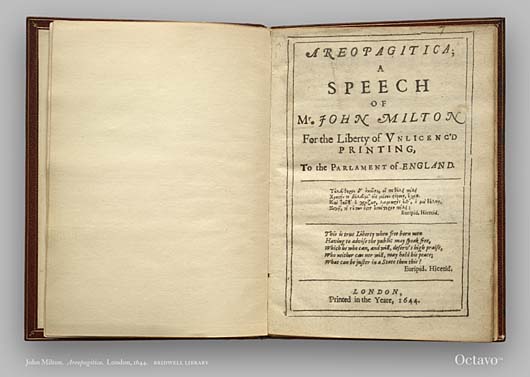Lecture:
Milton's Athletic Speech
Time line for the introduction of Print
1456: Gutenberg, using movable type for the first time, prints the Latin Bible in Germany
1521: as a leader of the Protestant Reformation Luther starts to translate the Bible into German
1545-1563 : Pope convenes the Council of Trent and the Inquisition à the first systematic Religious censorship
1603-1625: In England James I requires the licensing of books
1642-1649: Puritan Parliament vs. Charles I in Civil war. Now there are two governments in England, and a defacto liberty of the press.
By 1644 Parliament had won some military victories and ruled in London. Though Parliament had fought the monarch’s licensing law, it imposed its own licensing law in 1643. It is this law that provokes Milton into writing and printing Areopagitica: a Speech of Mr. John Milton For the Liberty of Unlicensed Printing, To the Parlament of England. Of course, he did so without the legally required license.
Pro-Censorship; or The Bad Logic of Licensing
1: the reader is vulnerable, susceptible and must be protected
2: books are like food or drugs à consuming them can be good or bad for you; the goal of the censors is to keep print culture as "pure" as possible
3: this prophylactic print media policy is based upon an essentially negative interpretation of virtue: one does good by not doing evil
4: the licensing system works by delegating to a few—the 20 licensers—the task of filtering out evil, error, etc.à authors and scholars are thereby rendered infantile, minors, etc.
5:
it is assumed that "we" (the Parliament) who appoint the licensing
board know what truth is, what evil is…; we censors can therefore
determine what others should print

The Test of Virtue
One 5-sentence paragraph of prose, recast as
a poem in 5 stanzas.
1: states main thesis and context of the
test: the state of man
As
therefore the state of man now is,
What
wisdom can there be to choose, what continence to forbear,
Without
the knowledge of evil?
2: the definition of the ‘true’ Christian
He
that can apprehend and consider vice with all her baits and seeming pleasures,
And
yet abstain, and yet distinguish, and yet prefer that which is truly better,
He
is the true wayfaring Christian.
3: Milton’s contrast of a cloistered and
athletic Virtue
I
cannot praise a fugitive and cloistered virtue, unexercised and unbreathed,
That
never sallies out and sees her adversary,
But
slinks out of the race, where that immortal garland is to be run for,
Not
without dust and heat.
4: virtue emerges from this test
Assuredly
we bring not innocence into the world, we bring impurity much rather:
That
which purifies is trail, and trial is by what is contrary.
5: Milton distinguishes between a blank
and genuine (because tested) virtue
That
virtue therefore which is but a youngling in the contemplation of evil,
And
knows not the utmost that vice promises to her followers, and rejects it,
Is
but a blank virtue, not a pure;
Describing
true temperance under the person of Guion,
Brings
him in with his palmer through the cave of Mammon and the bower of bliss,
That
he might see, and know, and yet abstain.
- This
paragraph "performs" what it describes: the dynamism of the
struggle for virtue.
Analogy: Truth is like (mythical) Osiris (it
exists, but its body is scattered):
1) Absence of truth to all mortals entails a
skepticism about any particular claim to Truth
+ 2) But belief that Truth exists, means one
sets about finding it in the future
= 3) Tolerance of the many different ways of
articulating truth
|
Pro-Censorship; or The Bad Logic of Licensing |
Anti-Censorship: the Good Logic of Ending Licensing: |
| the reader is vulnerable, susceptible and must be protected | The reader is hardy, active, and discriminating. |
| books are like food or drugs à consuming them can be good or bad for you; the goal of the censors is to keep print culture as "pure" as possible | Books are neither good or bad for you, but a complex compound of good and evil in books gives centrality to the way one readsà the actively virtuous reader can benefit from the evil book |
| this prophylactic print media policy is based upon an essentially negative interpretation of virtue: one does good by not doing evil | one cannot discover one's own nature or virtue without exposure, exercise and testing |
| the licensing system works by delegating to a few—the 20 licensers—the task of filtering out evil, error, etc.à authors and scholars are thereby rendered infantile, minors, etc. | by banning censorship, each author and reader becomes their own censor |
| it is assumed that "we" (the Parliament) who appoint the licensing board know what truth is, what evil is…; we censors can therefore determine what others should print | since Truth is scattered and uncertain, and always a work in progress, we should be skeptical of any particular version of Truth, and a wide variety of speech and writing should be tolerated |